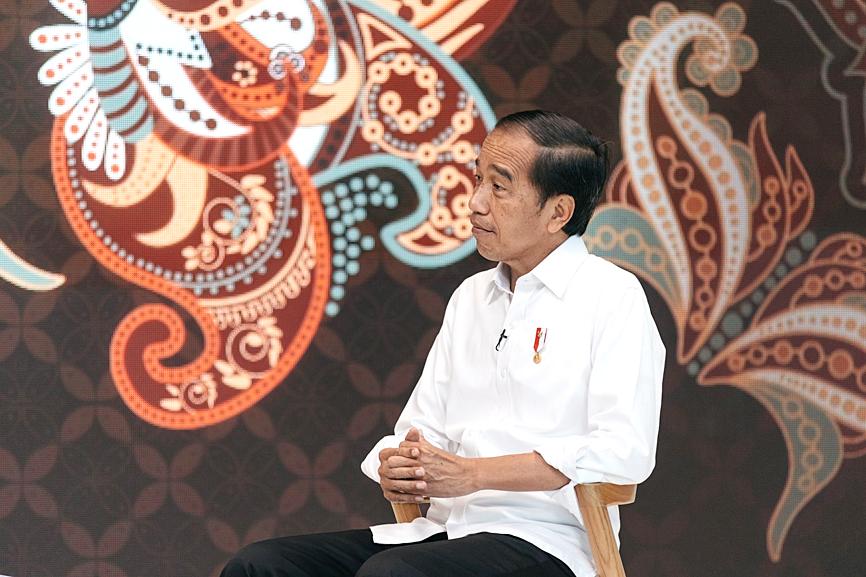Russian President Vladimir Putin and Chinese President Xi Jinping (習近平) plan to attend the upcoming G20 summit, the leader of the host nation, Indonesia, said in an interview published yesterday.
The pair’s attendance would set the stage for showdown talks with US President Joe Biden at a time when Washington is at odds with both rival powers, particularly over situations in Taiwan and Ukraine.
It has been unclear whether Putin and Xi would attend the November talks on the Indonesian island of Bali. Moscow is isolated after its invasion of Ukraine, while the Chinese leader is limiting foreign trips because of COVID-19.

Photo: Bloomberg
However, Indonesian President Joko Widodo, in an interview with Bloomberg, said both leaders would attend the G20 summit in person.
“Xi Jinping will come. President Putin has also told me he will come,” Widodo said, according to the report.
Kremlin officials in June said that Putin accepted Widodo’s invitation to the summit, and would attend so long as the COVID-19 pandemic allowed him to.
Indonesia currently holds the rotating G20 presidency, putting it at the center of global affairs as war rages in Europe and with tensions at their highest level in years in the Taiwan Strait, where China has been conducting its largest-ever military drills.
Jakarta has come under Western pressure to exclude Putin from the G20 gathering after announcing in April he had been invited.
However, Indonesia has maintained a neutral position and called for a peaceful resolution to the months-long conflict in Ukraine, with Widodo visiting Kyiv and Moscow earlier this year.
Indonesian Ministry of Foreign Affairs spokesman Teuku Faizasyah said that Russia and China “have received the invitation and said they would attend.”
“[It is] something that we are very much hopeful,” he added.
Indonesia has also invited Ukrainian President Volodymyr Zelenskiy to the summit with the world’s top economies, in a bid to foster compromise between the two countries.
The Ukrainian leader, whose country is not a G20 member, said he would attend at least virtually.
Russian Minister of Foreign Affairs Sergei Lavrov last month walked out of a G20 foreign ministers’ meeting in Bali after Moscow’s military assault on its neighbor was roundly condemned.
Xi has not traveled internationally since the outbreak of the COVID-19 pandemic, with a visit to Hong Kong under strict security measures being his only trip off the Chinese mainland.

A car bomb killed a senior Russian general in southern Moscow yesterday morning, the latest high-profile army figure to be blown up in a blast that came just hours after Russian and Ukrainian delegates held separate talks in Miami on a plan to end the war. Kyiv has not commented on the incident, but Russian investigators said they were probing whether the blast was “linked” to “Ukrainian special forces.” The attack was similar to other assassinations of generals and pro-war figures that have either been claimed, or are widely believed to have been orchestrated, by Ukraine. Russian Lieutenant General Fanil Sarvarov, 56, head

SAFETY FIRST: Double the number of police were deployed at the Taipei Marathon, while other cities released plans to bolster public event safety Authorities across Taiwan have stepped up security measures ahead of Christmas and New Year events, following a knife and smoke bomb attack in Taipei on Friday that left four people dead and 11 injured. In a bid to prevent potential copycat incidents, police deployments have been expanded for large gatherings, transport hubs, and other crowded public spaces, according to official statements from police and city authorities. Taipei Mayor Chiang Wan-an (蔣萬安) said the city has “comprehensively raised security readiness” in crowded areas, increased police deployments with armed officers, and intensified patrols during weekends and nighttime hours. For large-scale events, security checkpoints and explosives

PUBLIC SAFETY: The premier said that security would be tightened in transport hubs, while President Lai commended the public for their bravery The government is to deploy more police, including rapid response units, in crowded public areas to ensure a swift response to any threats, President William Lai (賴清德) said yesterday after a knife attack killed three people and injured 11 in Taipei the previous day. Lai made the remarks following a briefing by the National Police Agency on the progress of the investigation, saying that the attack underscored the importance of cooperation in public security between the central and local governments. The attack unfolded in the early evening on Friday around Taipei Main Station’s M7 exit and later near the Taipei MRT’s Zhongshan

REBUFFED: In response to Chinese criticism over recent arms sales, Washington urged Beijing to engage in meaningful dialogue instead of threats and intimidation Washington’s long-term commitment to Taiwan would not change, the US Department of State said yesterday, urging Beijing to stop pressuring Taiwan and engage in meaningful bilateral dialogues. The remarks came in response to a backlash from Beijing about Washington’s latest approval of arms sales to Taiwan. The US Defense Security Cooperation Agency said in a statement on Wednesday that the Taipei Economic and Cultural Representative Office in the US has asked to purchase an arms package, including Tactical Mission Network Software; AH-1W helicopter spare and repair parts; M109A7 self-propelled howitzers; HIMARS long range precision strike systems; tube-launched, optically tracked, wire-guided missiles; Javelin